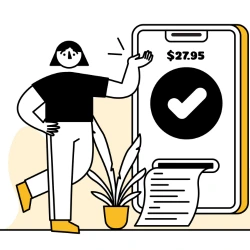In-app payment methods addressed in the Epic Games lawsuit.
The Epic vs. Apple App Store dispute has been the source of dramatic high-profile drama in the gaming world for three long years. The contention on the Apple app store payment policy has finally been resolved.
On January 16, Apple officially updated its App Store Guidelines to follow a 2021 ruling in its dispute with Epic Games. The case launched in August 2020, when Epic Games updated its gaming phenomenon, Fortnite, with an option that allowed players to purchase in-game currency for a discount through Epic rather than through the Apple App Store.

This allowed Epic Games to dodge Apple’s mandatory 30% fee on in-app purchases. Apple quickly removed Fortnite, claiming that it violated the Apple app store payment policy. Epic promptly filed a lawsuit. In September 2021, a judge declared this practice uncompetitive, ruling that Apple must allow app developers the option to offer payments outside the App Store ecosystem.
After successfully delaying the court’s decision to make time for appeals, Apple was finally forced to change its App Store policies, but not before one last unsuccessful effort to wall off access to external payments. When the final appeal was denied in January the case was essentially closed.
A series of other wins have numbed the pain of Apple’s loss on payment methods. The most important is crushing Epic’s dream of opening the impenetrable fortress of the iOS ecosystem. For now, Apple will not have to open their devices to third-party app stores or payments. Instead, they will only be required to offer developers the option to link to external payment options and only for apps offering in-app purchases.
This is not the first time Apple has been forced to relent on communications regarding outside payment methods. A 2019 lawsuit brought against the tech giant by small developers sparked numerous changes, most notably that developers could now contact their customers outside of an app to notify them of possible payment methods outside of Apple’s App Store. In hindsight, this represented a dam cracking, allowing Epic to break the whole thing open.
Previously, the Apple app store payment policy restricted such links through a method commonly known as “anti-steering.” Under the newly published guidelines, developers can request an in-app external link entitlement. Among other conditions, Apple’s guidelines state that the payment method linked to must be handled by a payment processor that:
- Is level 1 PCI-compliant.
- Has a customer service process in place to handle unauthorized transactions.
- Shows all prices to users in U.S. dollars.

While developers now have more payment freedom, Apple will still get its fair share of the profits. On purchases made after linking out to an external source, Apple will take a 27% cut of purchases made within seven days of a link out, a small discount from their in-app purchase fee. That fee is lowered to 12% for developers partaking in Apple’s Small Business program. The link must not actively discourage a user from buying in-app and can only appear in an app once. In addition, developers must provide monthly transaction reports to ensure Apple is getting the cut they desire.
The ruling also stated that Apple is not obligated to allow Epic Games back onto the App Store, meaning Fortnite will be left out in the cold for now. However, the ramifications of the court’s decision extend beyond the gaming sphere. European regulators have already begun to crack down on the App Store. New laws will go into effect this March that will open the store to sideloading—loading an app onto a phone through third-party methods. Apple plans on maintaining its iron fist approach by continuing to charge fees and keep a watchful eye over developers engaging in sideloading.
It’s clear that this recent decision regarding third-party app stores and payments signals a significant shift in the digital landscape. It’s an ideal time for technology businesses to explore how the right merchant services provider can save them even more on payment processing fees to offset hefty Apple App Store fees.





